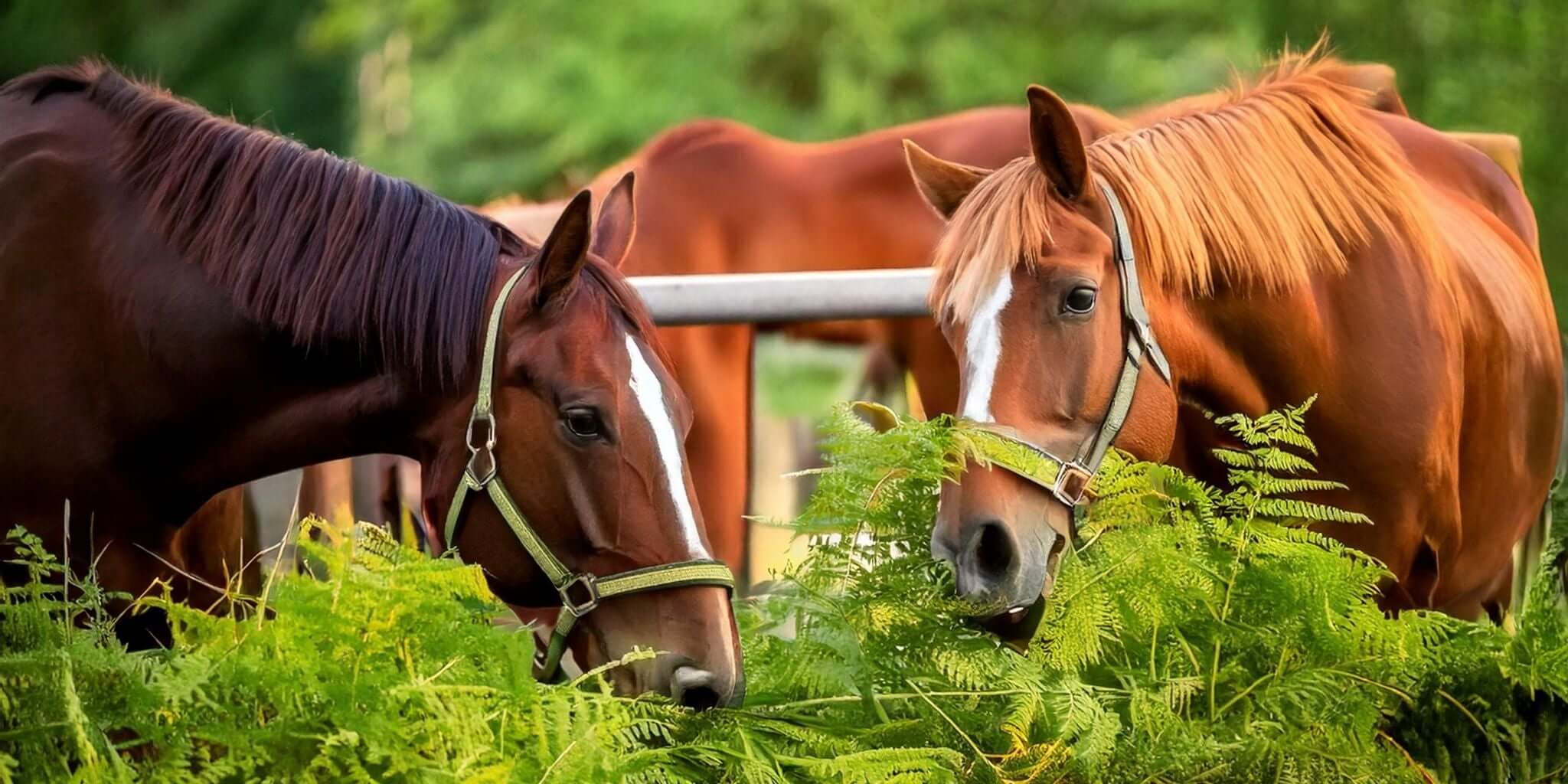給馬使用草藥的好處
照顧你的馬意味著專注於它們的身體健康、情緒健康和表現需求。雖然傳統的護理實踐很重要,但草藥等自然療法可以為從消化到壓力管理等問題提供額外的支持。幾個世紀以來,人們一直使用洋甘菊、大蒜和薑黃等草藥來自然地支持馬匹的健康。
在本指南中,我們將探討馬匹的最佳草藥、它們的益處以及如何安全使用它們。無論您的馬需要緩解壓力、改善消化還是改善關節健康,Sacred Plant Co 都提供一系列優質、對馬安全的草藥來幫助您滿足這些需求。
為什麼要給馬使用草藥?

自然和整體護理
草藥是大自然促進馬匹整體健康的解決方案。他們解決的是根本原因而不是症狀,為馬匹的健康提供了可持續的方法。
目標福利
歷史和現代用途
- 傳統:幾個世紀以來,馬匹飼養員一直依靠草藥來治療疾病並保持健康。
- 當代應用:現代研究證實了草藥對馬匹健康的有效性,並將其融入整體護理程序中。
草藥對馬的益處
草藥為馬匹提供一系列益處,既可滿足預防性護理,又可滿足特定的健康需求。
改善消化
關節和發炎支持
- 薑黃和魔鬼爪是天然的抗發炎藥,可以幫助馬緩解關節僵硬或關節炎。
呼吸健康
- 尤加利和百里香有助於清理呼吸道,減輕呼吸不適。
緩解壓力
增強免疫系統
最適合馬的草藥及其用途

洋甘菊
- 好處:減輕壓力、改善消化、緩解發炎。
- 使用方法:泡茶並與飼料混合,或提供乾燥花。
蒜
- 好處:增強免疫力、驅蟲、有益呼吸系統健康。
- 使用方法:添加蒜粉,少量、適量餵食。
榆樹
- 好處:舒緩消化道、減少發炎。
- 使用方法:將榆樹粉混入飼料中,有益於胃腸道健康。
薑黃
- 好處:減少炎症,支持關節健康,促進恢復。
- 使用方法:與黑胡椒和椰子油結合以達到最佳吸收效果。
蕁麻
- 優點:富含維生素和礦物質,可保持皮毛光澤和整體活力。
- 使用方法:添加乾葉來餵食或沖泡成營養豐富的茶。
纈草
- 優點:鎮靜神經系統,非常適合焦慮或有壓力的馬匹。
- 使用方法:少量使用,並在旅行或緊張事件前混入飼料中。
如何安全地使用草藥給馬匹
從小劑量開始
- 逐漸引入草藥並觀察馬的反應。
- 根據他們的體型、健康狀況和個人反應進行調整。
諮詢獸醫
- 確保您選擇的草藥不會幹擾現有的藥物或健康狀況。
製備方法
- 飼料添加劑:將草藥直接混入飼料中。
- 茶和沖泡:將草藥沖泡成茶,然後倒在食物上以便於食用。
- 濕敷劑:外用,治療關節或皮膚問題。
監測不良反應
- 留意不適、嗜睡或食慾改變的跡象。如果必要的話,請停止。
自製馬用草藥食譜

1. 鎮靜草本混合物
原料:
指示:
- 將香草放入碗中混合。
- 將其添加到馬的飼料中或泡入茶中以緩解壓力。
2. 關節保健金膏

原料:
- 2 大匙薑黃粉
- 1/4 茶匙 黑胡椒
- 1 大匙 椰子油
- 1/2 杯水
指示:
- 將原料放入平底鍋中加熱,攪拌至形成糊狀。
- 冷卻後,每天將 1-2 湯匙混入馬的飼料中。
3. 呼吸健康茶

原料:
- 1 大匙 乾百里香
- 1 大匙 乾尤加利樹
- 1茶匙蜂蜜
指示:
- 將草藥浸泡在沸水中 10 分鐘。
- 冷卻後與飼料混合或透過注射器注射。
4. 增強毛髮光澤的蕁麻頂飾

原料:
- 1/4 杯乾蕁麻葉
- 1 大匙 亞麻籽粉
指示:
- 將蕁麻和亞麻籽混入飼料中,可以改善毛髮的光澤和皮膚健康。
選擇並儲存馬用草藥的技巧
採購優質草藥
- 使用有機、無化學物質且對馬匹特別安全的草藥。
- Sacred Plant Co 確保每種草藥都符合這些標準。
正確儲存
- 將草藥存放在密封容器中,遠離潮濕和陽光。
輪換草藥
- 依季節或依需求輪換草藥,避免過度使用。
安全警告:安全地使用草藥給馬匹

雖然草藥可以為馬帶來許多健康益處,但必須負責任地使用它們以避免潛在的風險。遵循這些安全準則,可確保您的馬匹從草藥中受益,而不會產生副作用。
1. 先諮詢獸醫
- 在為您的馬的飲食中添加新的草藥之前,請務必諮詢獸醫,尤其是當您的馬正在服用藥物或有健康問題時。
- 討論劑量、潛在的相互作用以及是否適合您的馬的特定需求。
2. 使用對馬安全的草藥
- 並非所有草藥對馬來說都是安全的。避免使用可能有害的草藥,例如聖約翰草、紫草和毛地黃。
- 堅持使用對馬匹安全的選擇,如洋甘菊、大蒜和榆樹皮。
3. 逐漸引入草藥
- 從少量開始,以監測馬的反應。
- 逐步引入有助於最大限度地降低消化不良或過敏反應的風險。
4.避免過度使用
- 長期或過量使用某些草藥,例如大蒜,會導致毒性或貧血等副作用。
- 輪換使用草藥並僅在需要時使用,以防止產生耐受性或過度依賴。
5. 監測不良反應
- 引入新草藥後,注意觀察是否有不適、嗜睡、腹瀉或食慾變化的跡象。
- 如果出現不良反應,請立即停止使用並諮詢您的獸醫。
6. 確保適當的劑量
- 劑量取決於草藥、馬的大小以及其特定的健康需求。
- 使用過多的草藥可能會產生副作用,而過少則會無效。
7. 採購優質草藥
- 使用不含殺蟲劑、黴菌和污染物的草藥。
- Sacred Plant Co 提供優質、對馬匹安全的草藥,確保您的馬匹只獲得最優質的產品。
8. 正確儲存草藥
- 將草藥放在密封容器中,存放在陰涼乾燥處,避免陽光照射。
- 儲存不當可能會導致發黴或失去效力,從而傷害您的馬。
最後提醒
草藥可以成為維持馬匹健康的強大工具,但應始終小心使用並在專業人士的指導下使用。優先考慮安全和品質,確保您的馬匹透過自然療法茁壯成長。
關於馬用草藥的常見問題
所有的草藥對馬來說都是安全的嗎?
不,一些草藥如聖約翰草或紫草可能不適合。務必研究或諮詢獸醫師。
要多久才能看到結果?
效果各不相同,但持續使用通常會在幾週內顯現效果。
我可以混合多種草藥嗎?
是的,將洋甘菊和纈草等草藥結合在一起可以增強其鎮靜效果,但要慎重考慮。
照顧您的夥伴:探索使用草藥對馬匹進行天然護理的方法

草藥是增強馬匹健康和幸福感的天然、有效的方法。無論您的馬需要緩解壓力、改善消化或改善關節健康,將草藥納入日常護理中都可以產生顯著的效果。





